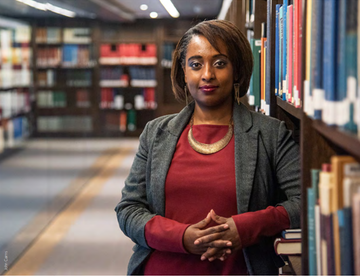My Oxford - Dr Mai Musié, Public Engagement Manager for the Bodleian Libraries

Blueprint, the University of Oxford's staff magazine, recently featured an article with the amazing Dr Mai Musié, TORCH collaborator and stalwart friend.
Dr Mai Musié, Public Engagement Manager for the Bodleian Libraries, discusses her experience of working at the University and why she feels collaboration is critical for its continuing success.
What attracted you to Oxford?
‘It was a serendipitous moment. In 1989, I came to the UK as a child refugee of the Ethiopian-Eritrean civil war. I ended up in London, spending most of my childhood and teenage years there. When I started work, a random conversation took me to Swansea to study Classics. Years later, when I took on a part-time PhD while working for Swansea University’s Reaching Wider initiative, a colleague asked me what my ideal career would be. I replied that it would be a combination of access and Classics – my two loves. Lo and behold, two weeks later Oxford advertised for a Classics Outreach Officer. I never thought in a million years that my application would be successful. The rest is history, as the saying goes’.
Was Oxford as you expected?
‘Yes and no. Prior to Swansea, the idea of ‘Oxbridge’ was alien to me. A student from my A level History group applied to Oxford – I remember we all thought he must be extremely clever. In Swansea, most of my Classics tutors had been taught at Oxford or Cambridge. Through them, and attending Classics conferences, I began to get an idea of what those two institutions were like. When I moved to Oxford in 2012 to take up my post at the Classics Faculty, I did initially feel homesick and alone. Gradually I began to warm to the place and I recognised the wealth of possibilities it could offer me – whether it was tapping into the various intellectual networks or just being around like-minded people.’
How did you go about ‘tapping in’?
‘When I joined the University, my manager encouraged me to keep pursuing my academic work, alongside my full-time outreach post, by joining the graduate community of Oxford. I found The Oxford Research Centre in the Humanities (TORCH) a fantastic resource; TORCH encourages connections and collaborations between humanities researchers and external institutions. I enjoy attending its seminars and lectures, being part of their Race and Resistance network, and attending its ‘Book at Lunchtime’ series. Selfpromotion alert: I was fortunate enough to participate in the latter with my book Forward with Classics, Bloomsbury 2018. ‘Being part of the Black Minority Ethnic (BME) Staff Network has really made me feel part of the Oxford community. It has given me a sense of belonging, a safe place where I can discuss issues and concerns with colleagues but also share best practices and ideas. Additionally, I am a member of the Research Support and Innovation Network; this is a great forum to share best practice, discuss latest funding opportunities and encourage interdisciplinary activity.’
What do you enjoy about working at Oxford?
‘I’ve been lucky to have a few different roles at Oxford which have all been really interesting. After managing the Classics access programme, I spent time working at Pembroke and with the Knowledge Exchange and Impact Team (KEIT) before taking up my current role.
‘These varied roles have shown me how vital collaboration and interaction is between all the different groups which make up the University. Every day I see how people are working to build a more inclusive network – this is great and it is what I understand when I hear ‘One Oxford’ mentioned.’
Can you give any examples of this collaboration?
‘Yes, just internally there is everything from the TORCH vision and the more formal networks it has created, including access, GLAM and PER activities, through to informal gatherings like the KEIT Office termly cake networking event and the Bodleian Libraries Friday coffee mornings (both are for University and college staff). These types of settings encourage fruitful interactions and potential collaborative opportunities.’
Why do you feel One Oxford is so important?
‘How I understand it is that, along with the goal of providing excellent education and delivering world-class research, we are striving to be inclusive, collaborative, and progressive. As the University becomes more diverse, it becomes more exceptional, and we cannot achieve this goal without working together.’
What’s your favourite part of Oxford and why?
‘My favourite part? That is a tough one. I suppose it is New College Lane at dusk. Walking around the buildings at this point in the evening, you can really sense the magic and wonder of Oxford. It is breathtakingly beautiful.’
Click here for information about equality-related staff and student networks, including networks supported by the Equality and Diversity Unit.
Click here for details of current TORCH networks.
Article and photo credit: Annette Cunningham, Blueprint Magazine Hilary 2020, Oxford.


